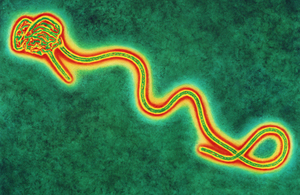Ebola surveillance and contingency planning ongoing in UK
Overall risk of Ebola remains low but robust, well-tested infectious disease systems active permanently in UK.

Ebola
Public Health England is continuing to work with government colleagues to ensure the UK remains alert to, and prepared for, the risk of Ebola. The overall risk of Ebola to the UK remains low.
The UK contingency plans for Ebola have always been based on the assumption that there is a low, but nevertheless real, risk of importing a case of Ebola from West Africa. However, it is important to remember that even if a case is identified here, the UK has robust, well-developed and well-tested NHS systems for managing unusual infectious diseases.
The World Health Organisation (WHO) recommends that the affected countries should conduct exit screening for individuals with unexplained illness consistent with potential Ebola infection. WHO also recommends that Ebola cases or contacts should not undertake international travel, unless the travel is part of an appropriate medical evacuation.
However, entry screening in the UK is not recommended by WHO. There are no plans to introduce entry screening for Ebola in the UK. This would require the UK to screen every returning traveller, as people could return to the UK from an affected country through any port of entry. This would be huge numbers of low risk people. PHE has provided UK Border Force with advice on the assessment of an unwell patient on entry to UK.
Dr Paul Cosford, director of health protection at Public Health England, said:
The risk of travellers and people working in affected countries contracting Ebola remains low, but PHE continues to keep border staff and medical practitioners informed, and request they remain vigilant for unexplained illness in those who have visited these areas in West Africa. As part of contingency preparations, PHE has provided primary care and hospital healthcare workers with the latest information about the outbreak and actions to take in the event of a possible case.
Advice has also been issued to UK immigration centres, universities and schools, and humanitarian workers travelling out to affected countries, and the general public. PHE will continue to liaise with the Border Agency and Port Health, and other partners, to provide ongoing guidance.
Dr Brian McCloskey, director of global health at Public Health England, said:
UK hospitals have a proven record of dealing with imported infectious diseases. If an Ebola case is repatriated to, or detected in, the UK they would receive appropriate treatment in an isolation unit, with all appropriate protocols promptly activated. Protective measures would be strictly maintained to minimise risk of transmission to healthcare workers treating the individual.
It is important to remember that for Ebola to be transmitted from one person to another contact with blood or other body fluids are needed. As such, if England was to see a case of Ebola this will not result in an outbreak here.
Our robust, well-developed and well-tested NHS systems for managing unusual infectious diseases are all active permanently, and always available and regularly tested and proven to be effective. The overall risk of Ebola to the UK remains low.
Ends
Notes to Editors
- A range of the Ebola guidance issued by PHE can be accessed from the Ebola virus disease: clinical management and guidance page.
- Public Health England exists to protect and improve the nation’s health and wellbeing, and reduce health inequalities. It does this through advocacy, partnerships, world-class science, knowledge and intelligence, and the delivery of specialist public health services. PHE is an operationally autonomous executive agency of the Department of Health. Website: www.gov.uk/phe. Twitter: @PHE_uk, Facebook: www.facebook.com/PublicHealthEngland
UKHSA press office: National Infection Service
UKHSA press office, infectious diseases
61 Colindale Avenue
London
NW9 5EQ